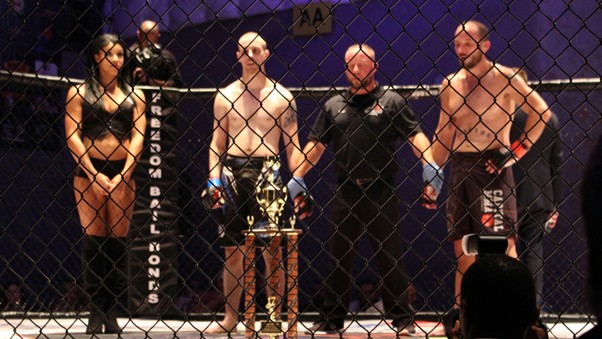As well as with any other sports, MMA advertising is a lucrative option for businesses willing to reach new audiences. Moreover, it seems to be going through some nice times in terms of popularity, which makes MMA marketing and athlete endorsements look even more promising. However, when talking about MMA business and its potential, it’s important to underline the different nature of its audience, which actually becomes its main advantage for those willing to promote themselves this way.

Why Make UFC Sponsorship Deals?
Before we dive into the details of those deals, let’s clarify the main reasons why this domain and this target audience are preferred to so many brands.
Fans Involvement and Loyalty
UFC fans are known for being loyal and for following their heroes in everything they do. It includes, naturally, the virtual world and all imaginable social media profiles. From this point, it looks rather easy.
Fighters’ Lifestyle
Now, this reason is interconnected with the first one. MMA fighters get attention easily, especially when we talk about someone loving flashy lifestyle. It’s easy to make your brand visible when you sponsor Conor McGregor.
Broad Audience Reach
Simple as that, MMA is on the rise of its popularity. From younger audiences to seasoned sports enthusiasts. And it uses various platforms, so a potential sponsor has what to choose from.
Fighters’ Businesses
As the practice shows, the fighters themselves start their businesses, relying on their popularity and fan base. So you may use their successes and connect your brand with their business. And it can be pretty everything. Having a profitable online casino? Making a deal with an MMA fighter is the nicest way to promote some legal gambling fun.
Being Associated with Sports
MMA is about power, endurance, and strength. Every brand wants to be associated with things like these. And given that special style that many fighters have, even promoting alcohol or tobacco could workout, with all that bad guy vibe.
Contributing to the Community
It’s not necessary to sponsor big MMA starts or fund huge athlete endorsement contracts. You can become a valuable part of your local community by contributing to various small initiatives. To many brands, it often means MMA gym sponsorships or even MMA apparel brands deals, for instance.
The Role of Sponsorships and Endorsements in a Fighter’s Income
Fighter sponsorships have long been a key revenue stream for MMA athletes. Brands seeking visibility align themselves with fighters, paying them to wear logos on fight gear, promote products on social media, or appear in advertisements. Before the UFC introduced its exclusive apparel deal, fighters could negotiate sponsorships freely, displaying multiple brand logos on their shorts and banners. While the Reebok and later Venum deals standardized pay, they also limited fighters’ direct sponsorship income.
Outside the UFC, many fighters rely heavily on sponsorships from training facilities and equipment brands to support their training costs. These agreements allow local gyms and companies to gain exposure while helping fighters sustain their careers. Sponsorship deals often make up a substantial portion of a fighter’s overall earnings, sometimes even surpassing fight purses, especially for those who build strong personal brands. The financial stability provided by sponsorships enables fighters to focus more on their training and performance rather than worrying about securing fights just to make ends meet.
Athlete Endorsement Contracts: What Goes Into a Deal?
Fighter endorsement deals in UMC vary widely based on a fighter’s marketability, fight record, and social media presence. Top-tier fighters secure million-dollar deals, while up-and-comers might settle for free gear or performance-based bonuses. The terms of these deals often include:
- Payment structure (flat fees, commission-based, or performance bonuses)
- Social media promotion obligations
- Public appearances and commercial involvement
- Exclusivity clauses preventing endorsements from competing brands
A fighter’s ability to negotiate favorable athlete sponsorship packages depends largely on their management team and overall marketability.
Branding Success Stories in MMA
Branding success stories in MMA showcase how fighters have strategically built their identities to transcend the sport. These serve as nice examples of what elements of one’s sports personality can be used for marketing purposes, while also showing their variety.
Conor McGregor and Khabib Nurmagomedov
McGregor’s Proper No. Twelve whiskey ventures and Khabib Nurmagomedov’s investments in fight promotions and nutrition brands illustrate the importance of diversifying revenue streams. These fighters demonstrate that a strong personal brand can outlast an MMA career.
Israel Adesanya
A great example is Israel Adesanya, who has built his brand through a unique mix of fight promotion, style, and pop culture references. His partnerships with Puma and ENGAGE show how a fighter can create a crossover appeal beyond just fighting.
Ronda Rousey
Another branding success is Ronda Rousey, who turned her dominance in the cage into Hollywood roles, video game endorsements, and WWE stardom. Her ability to transition across multiple entertainment sectors makes her a model for long-term fighter branding.
Jorge Masvidal
Jorge Masvidal has also established a strong personal brand with his “Gamebred” persona, launching his own mezcal company and promoting customized streetwear. His rise to stardom through the infamous “three-piece and a soda” moment shows how viral moments can be leveraged for financial gain and eventually become one of fighter’s income sources.
Concluding Thoughts
UFC provides an excellent marketing environment for brands to reach and expand their target audience. While still relatively new, MMA holds immense potential, attracting a diverse and loyal fan base that passionately follows their heroes.
Brand ambassador roles in MMA can vary widely, influenced by a fighter’s background and unique style. As the sport continues to grow, more brands will seek ambassadors who can connect their identity with fighters admired by thousands—if not millions—of devoted fans worldwide.
